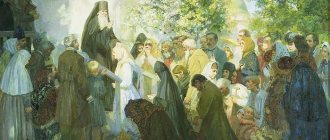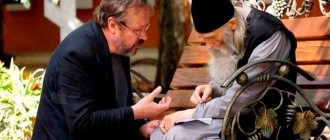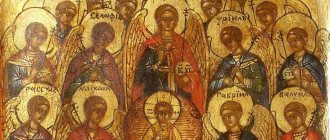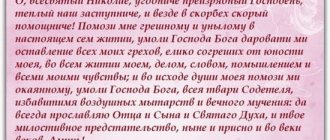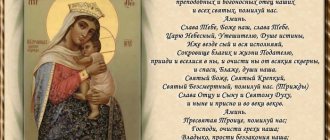Memory 10/23 October
The page of other publications about St. Ambrose and the Elders of Optina is here
Alexander Grenkov, the future father Ambrose, was born on November 21 or 23, 1812, in the spiritual family of the village of Bolshiye Lipovitsy, Tambov Diocese. Having graduated from the Theological School, he then successfully completed a course at the Theological Seminary. However, he did not go to the Theological Academy or become a priest. For some time he was a home teacher in a landowner family, and then a teacher at the Lipetsk Theological School. Possessing a lively and cheerful character, kindness and wit, Alexander Mikhailovich was very loved by his comrades and colleagues. In his last year at the Seminary, he had to suffer a dangerous illness, and he vowed to become a monk if he recovered.
Upon recovery, he did not forget his vow, but for several years he put off fulfilling it, “repenting,” as he put it. However, his conscience did not give him peace. And the more time passed, the more painful the remorse became. Periods of carefree fun and carelessness were followed by periods of acute melancholy and sadness, intense prayer and tears. Once, when he was already in Lipetsk, walking in a nearby forest, he, standing on the bank of a stream, clearly heard in its murmur the words: “Praise God, love God...”
At home, secluded from prying eyes, he fervently prayed to the Mother of God to enlighten his mind and direct his will. In general, he did not have a persistent will and already in old age he said to his spiritual children: “You must obey me from the first word. I am a compliant person. If you argue with me, I may give in to you, but it will not be to your benefit.” Exhausted by his indecision, Alexander Mikhailovich went for advice to the famous ascetic Hilarion, who lived in that area. “Go to Optina,” the elder told him, “and you will be experienced.” Grenkov obeyed. In the fall of 1839, he arrived in Optina Pustyn, where he was kindly received by Elder Leo.
Soon he took monastic vows and was named Ambrose, in memory of St. Milan, then was ordained a hierodeacon and, later, a hieromonk. When Father Macarius started his publishing business, Fr. Ambrose, who graduated from the seminary and was familiar with ancient and modern languages (he knew five languages), was one of his closest assistants. Soon after his ordination he fell ill. The illness was so severe and prolonged that it forever undermined the health of Father Ambrose and almost confined him to bed. Due to his illness, until his death he was unable to perform liturgies or participate in long monastic services.
Having comprehended Fr. Ambrose's serious illness undoubtedly had providential significance for him. She moderated his lively character, protected him, perhaps, from the development of conceit in him and forced him to go deeper into himself, to better understand himself and human nature. It’s not for nothing that subsequently Fr. Ambrose said: “It is good for a monk to be sick. And when you are sick, you don’t need to be treated, but only healed!” Helping Elder Macarius in his publishing activities, Fr. Ambrose continued to engage in this activity after his death. Under his leadership the following were published: “The Ladder” by Rev. John Climacus, letters and biography of Fr. Macarius and other books. But publishing activity was not the focus of Fr.’s senile works. Ambrose. His soul sought living, personal communication with people, and he soon began to gain fame as an experienced mentor and leader in matters not only of spiritual, but also of practical life. He had an unusually lively, sharp, observant and insightful mind, enlightened and deepened by constant concentrated prayer, attention to himself and knowledge of ascetic literature. By the grace of God, his insight turned into clairvoyance. He penetrated deeply into the soul of his interlocutor and read in it, as in an open book, without needing his confessions. His face, a Great Russian peasant, with prominent cheekbones and a gray beard, shone with intelligent and lively eyes. With all the qualities of his richly gifted soul, Fr. Ambrose, despite his constant illness and frailty, had inexhaustible cheerfulness, and was able to give his instructions in such a simple and humorous form that they were easily and forever remembered by everyone who listened. When necessary, he knew how to be exacting, strict and demanding, using “instruction” with a stick or imposing penance on the punished. The elder did not make any distinction between people. Everyone had access to him and could talk to him: a St. Petersburg senator and an old peasant woman, a university professor and a metropolitan fashionista, Solovyov and Dostoevsky, Leontiev and Tolstoy.
With what kind of requests, complaints, with what kind of sorrows and needs did people come to the elder! A young priest comes to him, a year ago appointed, of his own free will, to the very last parish in the diocese. He could not stand the poverty of his parish existence and came to the elder to ask for a blessing to change his place. Seeing him from afar, the elder shouted: “Go back, father! He is one, and there are two of you! The priest, perplexed, asked the elder what his words meant. The elder replied: “But there is only one devil who is tempting you, but your helper is God! Go back and don't be afraid of anything; It’s a sin to leave the parish! Serve the Liturgy every day and everything will be fine!” The delighted priest perked up and, returning to his parish, patiently carried on his pastoral work there and many years later became famous like the second elder Ambrose.
Tolstoy, after a conversation with Fr. Ambrose, joyfully said: “This Fr. Ambrose is a completely holy man. I talked to him, and somehow my soul felt light and joyful. When you talk to such a person, you feel the closeness of God.”
Another writer, Evgeny Pogozhev (Poselyanin) said: “I was struck by his holiness and the incomprehensible abyss of love that was in him. And looking at him, I began to understand that the meaning of the elders is to bless and approve life and the joys sent by God, to teach people to live happily and to help them bear the burdens that befall them, whatever they may be.” V. Rozanov wrote: “Benefits flow from him spiritually, and, finally, physically. Everyone is lifted up in spirit just by looking at him... The most principled people visited him (Fr. Ambrose), and no one said anything negative. Gold has passed through the fire of skepticism and has not tarnished.”
The old man had one Russian trait to a very strong degree: he loved to arrange something, to create something. He often taught others to undertake some business, and when private people came to him for a blessing on such a thing, he eagerly began to discuss and gave not only a blessing, but also good advice. It remains completely incomprehensible where Father Ambrose got the deepest information on all branches of human labor that were in him.
The outer life of the elder in the Optina monastery proceeded as follows. His day began at four or five in the morning. At this time, he called his cell attendants to him, and the morning rule was read. It lasted more than two hours, after which the cell attendants left, and the elder, left alone, indulged in prayer and prepared for his great daytime service. At nine o'clock the reception began: first for the monastics, then for the laity. The reception lasted until lunch. At about two o'clock they brought him meager food, after which he was left alone for an hour and a half. Then Vespers was read, and the reception resumed until nightfall. At about 11 o'clock the long evening ritual was performed, and not before midnight the elder was finally left alone. Father Ambrose did not like to pray in public. The cell attendant who read the rule had to stand in another room. One day, one monk violated the prohibition and entered the elder’s cell: he saw him sitting on the bed with his eyes directed to the sky and his face illuminated with joy.
So for more than thirty years, day after day, Elder Ambrose accomplished his feat. In the last ten years of his life, he took on another concern: the founding and organization of a women’s monastery in Shamordin, 12 versts from Optina, where, in addition to 1000 nuns, there was also an orphanage and a school for girls, an almshouse for old women and a hospital. This new activity was not only an unnecessary material concern for the elder, but also a cross placed on him by Providence and ending his ascetic life.
1891 was the last year in the elder’s earthly life. He spent the entire summer of this year in the Shamordino monastery, as if in a hurry to finish and arrange everything unfinished there. Urgent work was going on, the new abbess needed guidance and instructions. The elder, obeying the orders of the consistory, repeatedly set the days of his departure, but deteriorating health and ensuing weakness - a consequence of his chronic illness - forced him to postpone his departure. So the matter dragged on until the fall. Suddenly news came that the bishop himself, dissatisfied with the elder’s slowness, was going to come to Shamordino and take him away. Meanwhile, Elder Ambrose grew weaker every day. And so, the bishop had barely managed to travel half the way to Shamordin and stopped to spend the night in the Przemysl monastery when he was given a telegram informing him of the death of the elder. The Eminence changed his face and said embarrassedly: “What does this mean?” It was the evening of October 10 (22). The Eminence was advised to return to Kaluga the next day, but he replied: “No, this is probably the will of God! Bishops do not perform funeral services for ordinary hieromonks, but this is a special hieromonk - I want to perform the funeral service for the elder myself.”
It was decided to transport him to Optina Pustyn, where he spent his life and where his spiritual leaders, the elders Leo and Macarius, rested. The words of the Apostle Paul are engraved on the marble tombstone: “For I was weak, as I was weak, that I might gain the weak. I would be everything to everyone, that I might save everyone” (1 Cor. 9:22). These words accurately express the meaning of the elder’s life feat.
Advice from St. Ambrose of Optina to those living in the world
· If we abandon our desires and understandings and strive to fulfill the desires and understandings of God, then we will be saved in every place and in every state. And if we adhere to our desires and understandings, then no place, no state will help us. Even in paradise, Eve transgressed the commandment of God, and for the unfortunate Judas, life under the Savior himself did not bring any benefit. Everywhere patience and compulsion to a pious life are needed, as we read in the Holy Gospel.
· Anyone who wants to be saved must remember and not forget the apostolic commandment: “Bear one another’s burdens, and thus fulfill the Law of Christ.” There are many other commandments, but not a single one has such an addition, that is, “so fulfill the Law of Christ.” This commandment is of great importance, and before others we must take care of its fulfillment.
And the main commandments of the Lord: “Do not judge, and you will not be judged; do not condemn, lest you be condemned; release it and it will be released to you.” In addition, those who wish to be saved should always keep in mind the words of St. Peter of Damascus, that creation is accomplished between fear and hope.
· The Lord is ready to help a person acquire humility, as in all good things, but it is necessary for the person himself to take care of himself. Said by St. Fathers: “Give blood and receive spirit.” This means: work until blood is shed and you will receive a spiritual gift. And you are looking for spiritual gifts and asking, but you are sorry to shed blood, that is, you want everything so that no one touches you, does not bother you. Is it possible to acquire humility in a quiet life? After all, humility consists in when a person sees himself as the worst of all, not only people, but also dumb animals and even the spirits of evil themselves. And so, when people disturb you, you see that you cannot tolerate this and are angry with people, then you will inevitably consider yourself bad... If at the same time you regret your badness and reproach yourself for the malfunction, and sincerely repent of this before God and the spiritual father, then you are already on the path of humility... And if no one touched you, and you remained alone, how could you recognize your thinness? How could you see your vices?.. If they try to humiliate you, it means they want to humble you; and you yourself ask God for humility. Why then grieve for people?
· Teaching that in spiritual life one cannot neglect even unimportant circumstances, the elder sometimes said: “Moscow burned down from a penny candle.”
· Regarding judging and noticing other people’s sins and shortcomings, the priest said: “You need to pay attention to your inner life so as not to notice what is happening around you. Then you won’t judge.”
· Three rings cling to each other: hatred from anger, anger from pride.
· “Why do people sin?” - the elder sometimes asked a question and answered it himself: “Or because they don’t know what to do and what to avoid; or, if they know, they forget; if they do not forget, then they become lazy and despondent... These are three giants - despondency or laziness, oblivion and ignorance - from which the entire human race is bound by insoluble ties. And then comes negligence with all its host of evil passions. That is why we pray to the Queen of Heaven: “My Most Holy Lady Theotokos, with Your holy and all-powerful prayers, drive away from me, Your humble and accursed servant, despondency, oblivion, foolishness, negligence and all the nasty, evil and blasphemous thoughts.”
· “Don’t be like a bothersome fly, which sometimes flies around uselessly, and sometimes bites, and bothers both of them; and be like the wise bee, which in the spring diligently began its work and by autumn finished the honeycomb, which is as good as correctly written notes. One is sweet and the other is pleasant.”
· Father said: “We must live on earth as a wheel turns, only just one point touches the ground, and the rest constantly strives upward; but we, as soon as we lie down on the ground, cannot get up.”
· To the question: “How to live?”, the priest answered: “To live is not to bother, not to judge anyone, not to annoy anyone, and my respect to everyone.”
· “We need to live unhypocritically and behave exemplarily, then our cause will be true, otherwise it will turn out badly.”
· You need to force yourself, albeit against your will, to do some good to your enemies; and most importantly, do not take revenge on them and be careful not to somehow offend them with the appearance of contempt and humiliation.
· So that people would not remain careless and would not place their hope in outside prayerful help, the elder repeated the usual folk saying: “God help me, and the man himself does not lie.” And he added: “Remember, the twelve apostles asked the Savior for a Canaanite wife, but He did not hear them; and she began to ask and begged.”
· Father taught that salvation has three degrees. Said by St. John Chrysostom: a) do not sin, b) having sinned, repent, c) whoever repents poorly must endure the sorrows that come.
· After communion, one must ask the Lord to preserve the gift with dignity and that the Lord will give help not to return back, that is, to previous sins.
· When the priest was asked: “Why do you sometimes feel consolation after communion, and sometimes coldness?”, he answered: “He who seeks consolation from communion experiences coldness, but whoever considers himself unworthy, grace remains with him.”
· Humility is about giving in to others and considering yourself worse than everyone else. It will be much more peaceful.
· “It’s always better to give in,” said the priest, “if you insist fairly, it’s the same as a ruble of banknotes, and if you give in, it’s a ruble in silver.”
· To the question “How to acquire the fear of God?”, the priest answered: “You must always have God before you. I will foresee the Lord before me.”
· Father used to say: “Moses endured, Elisha endured, Elijah endured, and I will endure.”
· The elder often cited a proverb: “If you run from a wolf, you will attack a bear.” There is only one thing left to do - be patient and wait, paying attention to yourself and not judging others, and praying to the Lord and the Queen of Heaven, may He arrange for you what is beneficial, as They please.
October 22, 2011
TAKE CARE OF YOURSELF! READ “NASHBRATSK”! EVERYTHING WILL BE FINE!
30.11.2018
Many laymen and monastics turned to the Optina elders for advice. The instructions of the monks, clothed in the form of proverbs and sayings, remained in the memory of the pilgrims for a long time and served as a life guide for them.
The Monks Leo and Ambrose were special experts and lovers of folk speech, various sayings and proverbs. A peculiar spiritual thread connected the speech tradition of the Optina elders. This is how the reverends answered the same question. Leo, Ambrose and Joseph. Elder Leo was often asked: “Father! How did you capture such spiritual gifts as we see in you?” “He answered: “Live simpler, God will not leave you either.” Also about. Ambrose to the question: “How to live in order to be saved?” - he liked to answer: “We need to live unhypocritically and behave exemplarily, then our cause will be true, otherwise it will be bad” or “To live is not to bother, not to judge anyone, not to annoy anyone, and my respect to everyone.” And o. Joseph, cell attendant Fr. Ambrose, who after him accepted the burden of senile service, loved to repeat in his letters: “Live not as you want, but as God commands”; “You need to live like this: don’t judge anyone, don’t reproach, don’t get angry, don’t be proud, consider yourself in your soul worse than everyone else in the world.”
The elders communicated with people of different classes, knew how to listen sensitively to speech culture, and selected and used the most vivid and accurate images in their speech. Playful sayings, proverbs about. Leo was always favored and people's hearts were opened to him. Here are a few expressions characteristic of him: “Confess on a living thread” (i.e. quickly); “To save a soul is not to weave a bast shoe”; “He who has a voice and a hair has an extra demon”; “What you bought for, sell for”; “Teach the old to heal the dead”, etc. According to the recollections of contemporaries, the word of the elder “... consoled one in sorrow, aroused another from sinful stupor, animated the hopeless, released the bonds of despair itself, forced the unbeliever to obey and believe; in short, it could turn a carnal person to the path of spiritual life, of course, sincerely seeking this.” However, most of the proverbs and sayings belonged to Rev. Ambrose. The elder loved to repeat them during general blessings. Possessing a lively character, he skillfully used the sparkling and vivid imagery of proverbs.
Proverbs and sayings contained answers to questions of spiritual life: “Why is a person bad?” - “Because he forgets that God is above him,” it was said about Christian virtues - about patience and humility: “The house of the soul is patience, the food of the soul is humility. If there is no food in the house, the tenant gets out”; “Be smart and humble. Don’t judge others”; “He who gives in gains more”; “Humble yourself, and all your works will go well”; “Whoever thinks of himself that he has something will lose”; “If they really catch you, say: not calico, you won’t fade.” On prudent silence: “It is better to foresee and remain silent than to speak and then repent”; “Be silent in front of everyone, and everyone will love you.” About patiently bearing sorrows: “In sorrows, you will pray to God, and they will go away, but you cannot drive away the disease with a stick.” On being true to your word: “An unfulfilled promise is like a good tree without fruit.” The vices of vanity (“Don’t boast, peas, that you are better than beans: if you get wet, you’ll burst”) and slander (“If you want to prick someone with a word, then take a pin in your mouth and run after a fly”) were exposed.
The elder considered it necessary to explain some proverbs to his listeners in order to more deeply reveal their meaning and meaning in accordance with Christian teaching: “God himself heals the proud” - this means that internal sorrows (by which pride is healed) are sent from God, but the proud do not come from people will bear. But the humble one bears everything from people and will always say: “he is worthy of this.”
Many proverbs correlate with the texts of Holy Scripture: “Follow the publican’s path and you will be saved”; "Judge not lest ye be judged"; “You have to look down. Remember: you are earth, and to earth you will go”; “Blessing lips have no grievance”; “I languish the languishing me. Exhaustion is worse than death"; “The Kingdom of God is not in words, but in power: you need to interpret less, be silent more, not judge anyone, and my respect to everyone”; “Go where they lead you; look at what they show, and keep saying: Thy will be done!”
To one head of the monastery, in response to her words that the people entering the monastery were different, the elder replied: “Marble and metal - everything will do.” Then, after a pause, he continued: “The age is copper, the horn is iron, no one can erase the horns. The Holy Scripture says: I will break the horn of sinners, and the horn of the righteous will be exalted (Ps. 74:11). Sinners have two horns, but the righteous have one - humility." (The two horns of sinners here apparently represent two passions - pride and vanity.)
Some of the proverbs, which have parallels with Russian folk proverbs and sayings, were creatively reworked by the elder, with emphasis placed on other meanings; “To speak well is to scatter silver, and prudent silence is gold” (cf.: “The word is silver, and silence is gold”); “The mind is good, two is better, but three is good,” i.e. the advice of many people will not be useful (cf.: “A mind is good, but two are better”); “Everyone is the smith of his own destiny,” i.e. each person is the cause of his own sorrows (cf.: “Everyone is the smith of his own happiness”).
Some proverbs are addressed primarily to monastics: “To live in a monastery, you need patience, not a cartload, but a whole convoy”; “To be a nun, you must be either iron or gold: iron means having great patience, and gold means great humility”; “One must not choose a sister according to the spirit, otherwise it will be according to the flesh,” i.e. You shouldn't get too attached to anyone. To one nun, who had previously enjoyed honor, but later fell out of favor, the elder answered: “Whoever reproaches us gives us gifts, and whoever praises us steals from us,” i.e. one should humbly endure the vicissitudes of fate.
However, most proverbs contained instructions addressed to all listeners. For example, about the fact that it is easier to teach than to do something yourself: “Theory is a lady at court, and practice is like a bear in the forest”; about the need for compulsion to do any good deed: “You need to force yourself to dig ridges and do everything”; about Christian love: “God sends mercy to the one who works, and consolation to the one who loves”, about life as a preparation for eternity: “As you live, so you die”, about the complexity of the fight against sin: “Sins are like walnuts - you crack the shell, but It’s difficult to pick out the grain.”
During confession, the elder taught: “Tell your sins and blame yourself more than people”; “Don’t pass on other people’s business.” Loving simplicity, i.e. sincerity, absence of duplicity and hypocrisy, he said: “Where it’s simple, there are a hundred angels, and where it’s tricky, there’s not a single one”; “Look at everyone simply”; “Be simple and everything will pass”; “To live simply means not to judge, not to despise anyone.”
To the words of one lady that it is difficult to work with young people, he answered her this way: “It’s not a problem that there is quinoa in the rye, but it’s a problem when there is no rye or quinoa in the field.” And he added: “When you sow rye, quinoa grows; when you sow quinoa, rye grows.” Through your patience gain your souls [Lk. 21, 19]. And you endure from everyone, endure everything, and endure from children.”
Elder Ambrose loved to rhyme his teachings. For example, turning to Yulia, he used to say: “You didn’t Yulia yourself and didn’t lead others.”
Proverbs about. Ambrose was often repeated by his cell attendant, Fr. Joseph, who quoted the words of his mentor in his letters, linking them into a whole poem:
Boredom is the despondency of a grandson, and laziness is a daughter,
To drive her away,
Work hard in action, don’t be lazy in prayer:
Boredom will pass, and diligence will come.
And if you add patience and humility to this,
Then you will save yourself from all troubles and evils.
Bright, sparkling proverbs were a tool of spiritual edification. They spoke about the purpose of Christian life, about virtues and vices. They were more convincing than extensive teachings. The proverbs and sayings of the Optina elders have always been inscribed in a spiritual context; in form, they are vivid examples of folk speech; they played a prominent role in the spiritual tradition of Optina Pustyn.
Valentina KASHIRINA,
Candidate of Philology,
BrSU teacher
Sayings of Ambrose of Optina
Interesting, as proof of the poetry that always lived in this rich nature, was the fantasy that he had at one time to write poetry, which he himself later told about: “I confess to you, I once tried to write poetry, believing that it was easy. I chose a good place where there were valleys and mountains, and settled down to write there. For a long, long time I sat and thought about what and how to write; I didn’t write anything.” But his love of speaking in rhyme remained throughout his life. E. Poselyanin.
***
My incomprehensible child, peace and God’s blessings to you and every affirmation in patience and long-suffering, the imams have a great need for it, and may we graciously endure everything that comes our way and everything that happens to us.
***
Those who endure everything graciously and gratefully are promised peace there. But which one? And it’s impossible to say; You just need to live carefully for this, and above all, live humbly, and not anxiously, and act as you should and as you should. To repent of mistakes and humble yourself, but not to be embarrassed.
***
N! Don’t be like a bothersome fly, which sometimes flies around uselessly, and sometimes bites and annoys both of them, but be like a wise bee, who diligently began her work in the spring and by autumn has finished the honeycomb, which is as good as correctly written notes . One is sweet, the other is pleasant...
***
You, N, drink tea, only understand spiritual matters.
***
Without humility it is impossible to have peace. ***
Don’t take your word for any nonsense indiscriminately - that you can be born from dust and that people were formerly monkeys. But it is true that many people began to imitate monkeys and humiliate themselves to the point of monkeys.
***
Be patient; maybe a treasure will be revealed to you from somewhere, then you can think about life in a different way; in the meantime, arm yourself with patience and humility, and hard work, and self-reproach.
***
The Lord Himself does not force a person’s will, although He admonishes in many ways.
***
Infirmity, and weakness, and fatigue, and exhaustion, and to them also laziness and negligence - these are my companions! and with them is my constant presence.
***
Mother! It was said long ago not to lose heart, but to trust in the mercy and help of God! Listen to what they say, and eat what they serve.
***
Listen, sister! Don't be excited, don't be colorful! But be constant and meek, and you will be peaceful!
***
Don’t like to hear about the shortcomings of others, then you will have less of your own.
***
I hear about you, bossy mother, that you have not ceased to be despondent since you began to grieve when you received the news of your tonsure. Know that grief is like the sea: the more a person enters it, the more he sinks.
***
Peace to you and your dear goslings! Which are sometimes sweet, and sometimes rotten. ***
It would be nice, new mother...ina, if you had a pleasant and edifying face on the outside, while maintaining spiritual silence. Although it is not easy, and difficult, and not always convenient, it is useful for us and others.
***
Your spiritual temple, like four corners, is supported by your four prayer books... Stand firm, this temple, and do not waver, do not look back, neither on the right hand, nor on the side, but look straight to the east, from where the Lord came speaks about To myself: I have not come to do My will, but the will of the Father who sent Me.
***
To the said quaternary I will add two more quaternities. The Gospel teaching is affirmed by the four evangelists, and Christian life is affirmed by four main virtues: courage, wisdom, chastity and truth. I will not keep silent about the unhelpful and spiritually harmful quartet that exists: despondency, cowardice, impatience and evasion, which deprive us of complete power, and can deprive us of the good part if we succumb to them, even under a plausible pretext.
***
Mati! Don’t be discouraged, but trust in God’s mercy and help, and remember me, a sinner, in your prayers.
***
How are things going and where will they end?
***
I greet in the Lord NN: the singers, those who sing and read, the cell sisters, those who cook and walk, those who sweep and are troubled, but who do not lack in faith and hope. Will your temple soon be marvelous in truth?
***
In the whole world you will not find a sorrowless place; everywhere you will come to the same conclusion that you need to be patient.
***
They do not give rewards for joy, but only for sorrows and deeds.
***
He who gives in gains more.
***
Why is a person bad? Because he forgets that God is above him.
***
Where it’s simple, there are a hundred angels, and where it’s tricky, there’s not a single one.
***
People get completely different eyes from affection.
*** Whoever reproaches us gives us gifts, and whoever praises us steals from us.
***
Look, Melitona, stick to the middle tone; if you take it high, it will be difficult; if you take it low, it will be slimy; and you, Melitona, stick to the middle tone.
***
Kate! Not five minutes back. Katish! Watch where you're going. Roll to where it is quiet, smooth, and God's grace.
***
Lick! Look low, there is humility and patience is found.
***
Mother Eumenia! Collect your understanding.
***
It’s not a problem that there is quinoa in the rye, but it’s a problem when there is neither rye nor quinoa in the field.
***
That’s why the death was good, because she lived well. How you live is how you die.
***
If you listen to other people's speeches, you will have to put the donkey on your shoulders.
***
Go where they lead you; Look what they show, and everyone say: Thy will be done.
***
We need to live unhypocritically and behave exemplarily, then our cause will be true, otherwise it will turn out badly.
***
To live is not to bother, not to judge anyone, not to annoy anyone, and my respect to everyone.
***
People! Keep your mouth shut!
***
Elisha endured, Moses endured, Elijah endured, and I will endure.
***
In addition to the earthly authorities, there is also the Heavenly King on earth, the Holy Spirit, who governs everything and arranges what is useful for our benefit and removes what is not useful.
***
Strengthen yourself in the Lord and in the power of His strength! Let your soul rejoice in the Lord, for He has clothed us with the robe of salvation and clothed us with the robe of gladness; and speaks to us through the Apostle: always rejoice, give thanks in everything, for this is the will of God.
Source: To live is not to grieve. Sayings of Ambrose of Optina. Moscow, Nikeya, 2011
“LIVE IS NOT TO BURN, DO NOT JUDGE ANYONE, DO NOT ANNOYE ANYONE AND MY RESPECT TO ALL”
Instructions of Elder Ambrose of Optina
October 10/23 – commemoration of the great elder of the 19th century, St. Ambrose of Optina (1812–1891). We are publishing an excerpt from the book published by the Sretensky Monastery: “The Biography of the Optina Elder Hieroschemamonk Ambrose.”
His advice and instructions, which Elder Ambrose used to the souls of those who came to him in faith, he taught either often in a solitary conversation, or in general to everyone around him in the simplest, fragmentary and often humorous form. In general, it should be noted that the humorous tone of the elder’s edifying speech was his characteristic feature. ***
"How to live?" — the old man heard a general and very important question from all sides. As was his custom, he answered in a joking tone: “To live, don’t bother, don’t judge anyone, don’t annoy anyone, and my respect to everyone.” This tone of the elder’s speech often brought a smile to the lips of frivolous listeners. But if you delve more seriously into this instruction, then everyone will see a deep meaning in it. “Don’t push” - i.e. so that the heart is not carried away by the inevitable sorrows and failures for a person, heading towards the One Source of eternal sweetness - God; through which a person, in the face of countless and varied adversities, can calm himself down, putting up with them, or “resigning himself.” “Don’t judge”, “don’t annoy”. “There is nothing more common among people than condemnation and annoyance, these creatures of destructive pride.” They alone are enough to bring a person’s soul down to the bottom of hell, while for the most part Elder Ambrose they are not considered a sin. “My respect to everyone” - indicates the commandment of the Apostle: warn one another in respect (Rom 12:10). Reducing all these thoughts to one general one, we see that in the above saying the elder preached mainly humility, this foundation of spiritual life, the source of all virtues, without which, according to the teachings of St. John Chrysostom, as mentioned before, it is impossible to be saved.
***
In response to the general question put to the elder: “How to live?” - sometimes he answered somewhat differently: “You need to live unhypocritically and behave exemplarily; then our cause will be right, otherwise it will turn out badly.”
***
“We must,” the elder said, “live on earth as a wheel turns: just one point touches the ground, and the rest must certainly strive upward; but as soon as we lie down on the ground, we can’t get up.”
***
“Our salvation must be made between fear and hope.” When asked how the righteous, knowing that they live well according to God’s commandments, are not exalted by their righteousness, the elder replied: “They do not know what the end awaits them.” “Therefore,” he added, “our salvation must be achieved between fear and hope. No one should give in to despair under any circumstances, but one should not hope too much.”
***
Question: is it possible to desire improvement in spiritual life? The elder’s answer: “You can not only wish, but you should also try to improve in humility, i.e. in considering oneself in the feeling of the heart worse and lower than all people and every creature.”
***
About patience: “When someone annoys you, never ask why or why. This is nowhere in Scripture. So, on the contrary, it is said: if someone hits you on the right side of the cheek, give him the other one too. It is actually inconvenient to hit the gum cheek, but this should be understood this way: if someone slanders you or innocently annoys you with something, this will mean hitting the gum cheek. Don’t complain, but bear this blow patiently, offering your left cheek, i.e. remembering your wrongdoings. And if, perhaps, you are now innocent, then before you sinned a lot; and thus you will be convinced that you are worthy of punishment.”
***
If one of the brethren, out of cowardice and impatience, grieved that he was not soon being presented to the mantle, or to the hierodeaconry and hieromonasticism, the elder used to say this for edification: “This, brother, everything will come in due time,” they will give everything; no one will give good deeds.”
*** About irritability: “No one should justify their irritability by some illness - this comes from pride. But the anger of man, according to the word of the holy Apostle James, does not create the righteousness of God (James 1:20). In order not to indulge in irritability and anger, one should not rush.”
***
Talking about envy and memory, the elder said: “You need to force yourself, albeit against your will, to do some good to your enemies; and most importantly, do not take revenge on them and be careful not to somehow offend them with the appearance of contempt and humiliation.”
***
“Love, of course, is higher than everything. If you find that there is no love in you, but you want to have it, then do deeds of love, even if first without love. The Lord will see your desire and effort and put love in your heart.”
***
“Whoever has a bad heart should not despair, because with the help of God a person can correct his heart. You just need to carefully monitor yourself and not miss the opportunity to be useful to your neighbors, often open up to the elder and give alms within your power. This, of course, cannot be done suddenly, but the Lord is patient. He only ends a person’s life when he sees him ready for the transition to eternity or when he sees no hope for his correction.”
***
Elder Ambrose said about alms: “Saint Demetrius of Rostov writes: if a man on a horse comes to you and asks you, give it to him. How he uses your alms is not your responsibility.” ***
Also: “St. John Chrysostom says: start giving to the poor what you don’t need, what you have lying around; then you will be able to give more, even with deprivation of yourself, and finally you will be ready to give everything you have.”
***
When asked how to understand the words of Scripture: be wise as serpents (Matthew 10:16), the elder explained: “A snake, when it needs to change its old skin for a new one, passes through a very tight, narrow place, and thus it is comfortable it happens to leave behind one’s former skin: so a person, wanting to remove his old age, must follow the narrow path of fulfilling the Gospel commandments. During any attack, the snake tries to protect its head. A person must protect his faith most of all. As long as faith is maintained, everything can still be corrected.”
***
“I once told the priest,” writes his spiritual daughter, “about one family that I feel very sorry for all of them - they do not believe in anything, neither in God, nor in the future life; It’s a pity precisely because they may not be to blame for this themselves, they were brought up in such unbelief or there were other reasons. Father shook his head and said angrily: “There is no excuse for atheists. After all, the Gospel is preached to everyone, to everyone, even to the pagans; finally, by nature, we are all from birth endowed with the feeling of knowing God; therefore, they themselves are to blame. Are you asking if it is possible to pray for such people? Of course, you can pray for everyone.” “Father! - I said after that. “After all, someone whose close relatives will suffer in hell cannot feel complete bliss in the future life?” And the priest said to this: “No, this feeling will no longer be there: then you will forget about everyone. It's just like taking an exam. When you go to an exam, it’s still scary and you’re filled with all sorts of thoughts, but when you come, you take a ticket (to answer), and you forget about everything.”
***
Some gentleman came to the elder who did not believe in the existence of demons. The gentleman said: “Your will, father, I don’t even understand what kind of demons these are.” To this the elder replied: “After all, not everyone understands mathematics, but it exists.”
***
About laziness and despondency: “Boredom is the grandson of despondency, and laziness is the daughter. To drive her away, work hard in action, don’t be lazy in prayer; then boredom will pass and diligence will come. And if you add patience and humility to this, you will save yourself from many evils.”
***
About insensibility and fearlessness, regarding the sudden death of S., the priest said: “Death is not just around the corner, but behind us, and we can at least have a stake on our heads.”
*** He also said: “If at one end of the village they hang people, at the other end they will not stop sinning, saying: they will not reach us soon.”
***
He told the following about the power of repentance: “One kept sinning and repenting, and so on all his life. Finally he repented and died. An evil spirit came for his soul and said: he is mine. The Lord says: no, he repented. “But even though he repented, he sinned again,” the devil continued. Then the Lord said to him: “If you, being angry, accepted him again after he repented to Me, then how could I not accept him after he, having sinned, again turned to Me with repentance? You forget that you are evil and I am good.”
***
“It happens,” the priest said, “that although our sins are forgiven through repentance, our conscience still does not cease to reproach us. The late elder Father Macarius, for comparison, sometimes showed his finger, which had long ago been cut: the pain had long passed, but the scar remained. Likewise, even after the forgiveness of sins, scars remain, i.e. reproaches of conscience." ***
“Although the Lord forgives the sins of those who repent, every sin requires a cleansing punishment. For example, the Lord Himself said to the prudent thief: Today you will be with Me in Paradise (Luke 23:48); and meanwhile, after these words, they broke his legs; And what was it like to hang on the cross for three hours on only your hands, with broken shins? This means that he needed purifying suffering. For sinners who die immediately after repentance, the prayers of the Church and those praying for them serve as cleansing, and those who are still alive must themselves be cleansed by correcting their lives and by alms covering their sins.”
***
“God does not create the cross for man (i.e., cleansing mental and physical suffering). And no matter how heavy the cross that a person bears in life may be, the tree from which it is made always grows on the soil of his heart.” Pointing to his heart, the priest added: “The tree is where the waters issue, the waters (passions) are seething there.”
***
“When a person,” the elder said, “walks the straight path, there is no cross for him. But when he retreats from him and begins to rush in one direction or another, then different circumstances appear that push him back onto the straight path. These shocks constitute a cross for a person. They are, of course, different, depending on who needs which one.”
***
“Sometimes innocent suffering is sent to a person so that, following the example of Christ, he suffers for others. The Savior Himself first suffered for people. His apostles also suffered for the Church and for the people. To have perfect love means to suffer for your neighbors.”
***
The elder also said: “One brother asked another: who taught you the Jesus Prayer? And he answers: demons. - “How can that be?” “Yes, so: they bother me with sinful thoughts, but I did everything and said prayer, and I got used to it.”
***
One brother complained to the elder that during prayer there were many different thoughts. The elder said to this: “A man was driving through the market; there is a crowd of people around him, talk, noise, and he is all on his horse: but, but! but-but! — and so, little by little, I drove through the entire bazaar. So you too, no matter what your thoughts say, do all your work - pray!”
***
So that people would not remain careless and would not place all their hope on outside prayerful help, the elder repeated the usual folk saying: “God help me, and the man himself does not lie.” And T. said: “Father! Through whom should we ask, if not through you?” The elder replied: “And ask yourself; Remember, the twelve apostles asked the Savior for a Canaanite wife, but He did not hear them; and she began to ask and begged.”
***
But since prayer is the most powerful weapon against the invisible enemy, he tries in every possible way to distract a person from it. The elder related the following story: “On Mount Athos, one monk had a talking starling, which the monk loved very much, being carried away by his conversations. But it’s strange: as soon as the monk begins to fulfill his prayer rule, the starling starts talking and does not allow the monk to pray. Once on the bright holiday of the Resurrection of Christ, a monk approached the cage and said: “Skvorushka, Christ is risen!” And the starling answers: “That’s our misfortune, that he has risen,” and immediately died, and an unbearable stench filled the monk’s cell. Then the monk realized his mistake and repented.”
***
That God most importantly looks at the inner prayer mood of a person’s soul, the elder said about this: “One day I came to the above-mentioned Father Abbot Anthony, who was sick with his legs and said: “Father, my legs hurt, I can’t bow down, and this is me.” It’s embarrassing.” Father Anthony answered him: “Yes, the Scripture says: Son, give me a heart, not legs.” ***
“Why do people sin?” - the elder sometimes asked a question and solved it himself: “Either because they don’t know what to do and what to avoid, or if they know, they forget; if they don’t forget, they become lazy and despondent. On the contrary, since people are very lazy in matters of piety, they very often forget about their main duty - to serve God; from laziness and oblivion they reach extreme foolishness or ignorance. These are three giants - despondency or laziness, oblivion and ignorance - from which the entire human race is bound by insoluble bonds. And then comes negligence with all its host of evil passions. That is why we pray to the Queen of Heaven: My Most Holy Lady Theotokos, with Your holy and all-powerful prayers, drive away from me, Your humble and accursed servant, despondency, oblivion, foolishness, negligence and all the nasty, evil and blasphemous thoughts...”
Schema-Archimandrite Agapit (Belovidov)
For the soul...(What helps you live)
Instructions of Elder Ambrose of Optina
October 10/23 – commemoration of the great elder of the 19th century, St. Ambrose of Optina (1812–1891). We are publishing an excerpt from the book published by the Sretensky Monastery: “The Biography of the Optina Elder Hieroschemamonk Ambrose.”
His advice and instructions, which Elder Ambrose used to the souls of those who came to him in faith, he taught either often in a solitary conversation, or in general to everyone around him in the simplest, fragmentary and often humorous form. In general, it should be noted that the humorous tone of the elder’s edifying speech was his characteristic feature. ***
"How to live?" — the old man heard a general and very important question from all sides. As was his custom, he answered in a joking tone: “To live, don’t bother, don’t judge anyone, don’t annoy anyone, and my respect to everyone.” This tone of the elder’s speech often brought a smile to the lips of frivolous listeners. But if you delve more seriously into this instruction, then everyone will see a deep meaning in it. “Don’t push” - i.e. so that the heart is not carried away by the inevitable sorrows and failures for a person, heading towards the One Source of eternal sweetness - God; through which a person, in the face of countless and varied adversities, can calm himself down, putting up with them, or “resigning himself.” “Don’t judge”, “don’t annoy”. “There is nothing more common among people than condemnation and annoyance, these creatures of destructive pride.” They alone are enough to bring a person’s soul down to the bottom of hell, while for the most part they are not considered a sin.
“My respect to everyone” - indicates the commandment of the Apostle: warn one another in respect (Rom 12:10). Reducing all these thoughts to one general one, we see that in the above saying the elder preached mainly humility, this foundation of spiritual life, the source of all virtues, without which, according to the teachings of St. John Chrysostom, as mentioned before, it is impossible to be saved.
***
In response to the general question put to the elder: “How to live?” - sometimes he answered somewhat differently: “You need to live unhypocritically and behave exemplarily; then our cause will be right, otherwise it will turn out badly.”
***
“We must,” the elder said, “live on earth as a wheel turns: just one point touches the ground, and the rest must certainly strive upward; but as soon as we lie down on the ground, we can’t get up.”
***
“Our salvation must be made between fear and hope”
When asked how the righteous, knowing that they live well according to God’s commandments, are not exalted by their righteousness, the elder replied: “They do not know what the end awaits them.” “Therefore,” he added, “our salvation must be achieved between fear and hope. No one should give in to despair under any circumstances, but one should not hope too much.”
***
Question: is it possible to desire improvement in spiritual life? The elder’s answer: “You can not only wish, but you should also try to improve in humility, i.e. in considering oneself in the feeling of the heart worse and lower than all people and every creature.”
***
About patience: “When someone annoys you, never ask why or why. This is nowhere in Scripture. So, on the contrary, it is said: if someone hits you on the right side of the cheek, give him the other one too. It is actually inconvenient to hit the gum cheek, but this should be understood this way: if someone slanders you or innocently annoys you with something, this will mean hitting the gum cheek. Don’t complain, but bear this blow patiently, offering your left cheek, i.e. remembering your wrongdoings. And if, perhaps, you are now innocent, then before you sinned a lot; and thus you will be convinced that you are worthy of punishment.”
***
If one of the brethren, out of cowardice and impatience, grieved that he was not soon being presented to the mantle, or to the hierodeaconry and hieromonasticism, the elder used to say this for edification: “This, brother, everything will come in due time,” they will give everything; no one will give good deeds.”
***
“In order not to indulge in irritability and anger, one should not rush” About irritability: “No one should justify their irritability by some illness - this comes from pride. But the anger of man, according to the word of the holy Apostle James, does not create the righteousness of God (James 1:20). In order not to indulge in irritability and anger, one should not rush.”
***
Talking about envy and memory, the elder said: “You need to force yourself, albeit against your will, to do some good to your enemies; and most importantly, do not take revenge on them and be careful not to somehow offend them with the appearance of contempt and humiliation.”
***
“Love, of course, is higher than everything. If you find that there is no love in you, but you want to have it, then do deeds of love, even if first without love. The Lord will see your desire and effort and put love in your heart.”
***
“Whoever has a bad heart should not despair, because with the help of God a person can correct his heart. You just need to carefully monitor yourself and not miss the opportunity to be useful to your neighbors, often open up to the elder and give alms within your power. This, of course, cannot be done suddenly, but the Lord is patient. He only ends a person’s life when he sees him ready for the transition to eternity or when he sees no hope for his correction.”
***
Elder Ambrose said about alms: “Saint Demetrius of Rostov writes: if a man on a horse comes to you and asks you, give it to him. How he uses your alms is not your responsibility.” ***
Also: “St. John Chrysostom says: start giving to the poor what you don’t need, what you have lying around; then you will be able to give more, even with deprivation of yourself, and finally you will be ready to give everything you have.”
***
When asked how to understand the words of Scripture: be wise as serpents (Matthew 10:16), the elder explained: “A snake, when it needs to change its old skin for a new one, passes through a very tight, narrow place, and thus it is comfortable it happens to leave behind one’s former skin: so a person, wanting to remove his old age, must follow the narrow path of fulfilling the Gospel commandments. During any attack, the snake tries to protect its head. A person must protect his faith most of all. As long as faith is maintained, everything can still be corrected.”
***
“There is no excuse for atheists” “I once told the priest,” writes his spiritual daughter, “about one family, that I am very sorry for all of them, - they do not believe in anything, neither in God, nor in the future life; It’s a pity precisely because they may not be to blame for this themselves, they were brought up in such unbelief or there were other reasons. Father shook his head and said angrily: “There is no excuse for atheists. After all, the Gospel is preached to everyone, to everyone, even to the pagans; finally, by nature, we are all from birth endowed with the feeling of knowing God; therefore, they themselves are to blame. Are you asking if it is possible to pray for such people? Of course, you can pray for everyone.” “Father! - I said after that. “After all, someone whose close relatives will suffer in hell cannot feel complete bliss in the future life?” And the priest said to this: “No, this feeling will no longer be there: then you will forget about everyone. It's just like taking an exam. When you go to an exam, it’s still scary and you’re filled with all sorts of thoughts, but when you come, you take a ticket (to answer), and you forget about everything.”
***
Some gentleman came to the elder who did not believe in the existence of demons. The gentleman said: “Your will, father, I don’t even understand what kind of demons these are.” To this the elder replied: “After all, not everyone understands mathematics, but it exists.”
***
About laziness and despondency: “Boredom is the grandson of despondency, and laziness is the daughter. To drive her away, work hard in action, don’t be lazy in prayer; then boredom will pass and diligence will come. And if you add patience and humility to this, you will save yourself from many evils.”
***
About insensibility and fearlessness, regarding the sudden death of S., the priest said: “Death is not just around the corner, but behind us, and we can at least have a stake on our heads.”
***
“Death is not just around the corner, but behind us, and at least we have a stake on our heads.” He also said: “If at one end of the village they hang people, at the other end they will not stop sinning, saying: they will not reach us soon.”
***
He told the following about the power of repentance: “One kept sinning and repenting, and so on all his life. Finally he repented and died. An evil spirit came for his soul and said: he is mine. The Lord says: no, he repented. “But even though he repented, he sinned again,” the devil continued. Then the Lord said to him: “If you, being angry, accepted him again after he repented to Me, then how could I not accept him after he, having sinned, again turned to Me with repentance? You forget that you are evil and I am good.”
***
“It happens,” the priest said, “that although our sins are forgiven through repentance, our conscience still does not cease to reproach us. The late elder Father Macarius, for comparison, sometimes showed his finger, which had long ago been cut: the pain had long passed, but the scar remained. Likewise, even after the forgiveness of sins, scars remain, i.e. reproaches of conscience." ***
“Although the Lord forgives the sins of those who repent, every sin requires a cleansing punishment. For example, the Lord Himself said to the prudent thief: Today you will be with Me in Paradise (Luke 23:48); and meanwhile, after these words, they broke his legs; And what was it like to hang on the cross for three hours on only your hands, with broken shins? This means that he needed purifying suffering. For sinners who die immediately after repentance, the prayers of the Church and those praying for them serve as cleansing, and those who are still alive must themselves be cleansed by correcting their lives and by alms covering their sins.”
***
“God does not create the cross for man (i.e., cleansing mental and physical suffering). And no matter how heavy the cross that a person bears in life may be, the tree from which it is made always grows on the soil of his heart.” Pointing to his heart, the priest added: “The tree is where the waters issue, the waters (passions) are seething there.”
***
“When a person,” the elder said, “walks the straight path, there is no cross for him. But when he retreats from him and begins to rush in one direction or another, then different circumstances appear that push him back onto the straight path. These shocks constitute a cross for a person. They are, of course, different, depending on who needs which one.”
***
“Sometimes innocent suffering is sent to a person so that, following the example of Christ, he suffers for others. The Savior Himself first suffered for people. His apostles also suffered for the Church and for the people. To have perfect love means to suffer for your neighbors.”
***
The elder also said: “One brother asked another: who taught you the Jesus Prayer? And he answers: demons. - “How can that be?” “Yes, so: they bother me with sinful thoughts, but I did everything and said prayer, and I got used to it.”
***
One brother complained to the elder that during prayer there were many different thoughts. The elder said to this: “A man was driving through the market; there is a crowd of people around him, talk, noise, and he is all on his horse: but, but! but-but! — and so, little by little, I drove through the entire bazaar. So you too, no matter what your thoughts say, do all your work - pray!”
***
So that people would not remain careless and would not place all their hope on outside prayerful help, the elder repeated the usual folk saying: “God help me, and the man himself does not lie.” And T. said: “Father! Through whom should we ask, if not through you?” The elder replied: “And ask yourself; Remember, the twelve apostles asked the Savior for a Canaanite wife, but He did not hear them; and she began to ask and begged.”
***
But since prayer is the most powerful weapon against the invisible enemy, he tries in every possible way to distract a person from it. The elder related the following story: “On Mount Athos, one monk had a talking starling, which the monk loved very much, being carried away by his conversations. But it’s strange: as soon as the monk begins to fulfill his prayer rule, the starling starts talking and does not allow the monk to pray. Once on the bright holiday of the Resurrection of Christ, a monk approached the cage and said: “Skvorushka, Christ is risen!” And the starling answers: “That’s our misfortune, that he has risen,” and immediately died, and an unbearable stench filled the monk’s cell. Then the monk realized his mistake and repented.”
***
That God most importantly looks at the inner prayer mood of a person’s soul, the elder said about this: “One day I came to the above-mentioned Father Abbot Anthony, who was sick with his legs and said: “Father, my legs hurt, I can’t bow down, and this is me.” It’s embarrassing.” Father Anthony answered him: “Yes, the Scripture says: Son, give me a heart, not legs.” ***
“Why do people sin?” - the elder sometimes asked a question and solved it himself: “Either because they don’t know what to do and what to avoid, or if they know, they forget; if they don’t forget, they become lazy and despondent. On the contrary, since people are very lazy in matters of piety, they very often forget about their main duty - to serve God; from laziness and oblivion they reach extreme foolishness or ignorance. These are three giants - despondency or laziness, oblivion and ignorance - from which the entire human race is bound by insoluble bonds. And then comes negligence with all its host of evil passions. That is why we pray to the Queen of Heaven: My Most Holy Lady Theotokos, with Your holy and all-powerful prayers, drive away from me, Your humble and accursed servant, despondency, oblivion, foolishness, negligence and all the nasty, evil and blasphemous thoughts...”
Schema-Archimandrite Agapit (Belovidov) October 23, 2016
